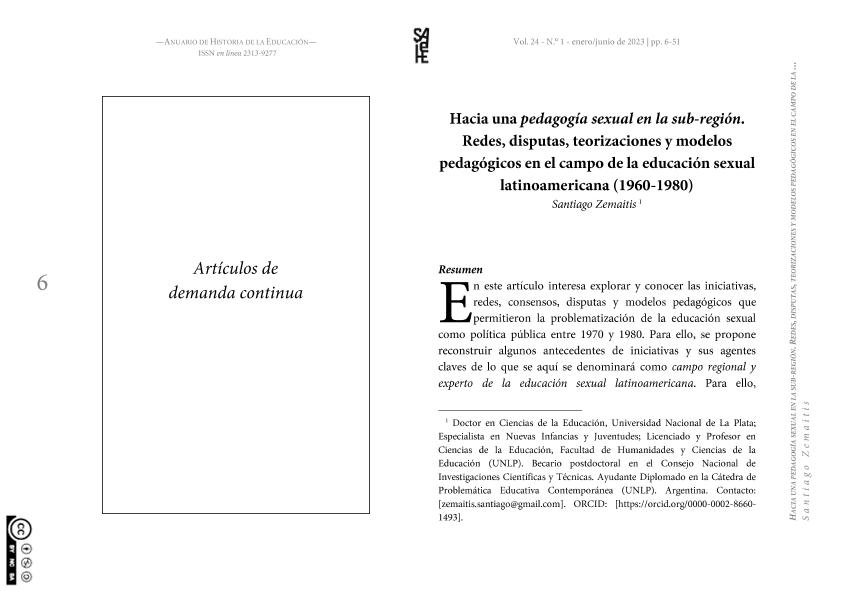Artículo
En este artículo interesa explorar y conocer las iniciativas, redes, consensos, disputas y modelos pedagógicos que permitieron la problematización de la educación sexual como política pública entre 1970 y 1980. Para ello, se propone reconstruir algunos antecedentes de iniciativas y sus agentes claves de lo que se aquí se denominará como campo regional y experto de la educación sexual latinoamericana. Para ello, inicialmente se contextualiza la situación de la región latinoamericana a mediados de siglo XX, con énfasis en el lugar de las ideas desarrollistas y de algunos organismos internacionales de financiamiento en la promoción de la “educación en población” y en programas de planificación familiar. Seguidamente, se revisan algunas iniciativas pioneras en la Argentina en promover la educación sexual, como la Asociación Argentina de Protección Familiar (1966), la Asociación Rosarina de Educación Sexual y Sexología (1976) y el Centro de Orientación para la Vida Familiar y Comunitaria (1964). Desde allí interesará mapear a algunas/os agentes que fueron decisivos para establecer relaciones y conexiones con otros países. En tercer lugar, se exploran tres iniciativas regionales como la Oficina Latinoamericana de Educación Sexual y el Comité Regional de Educación Sexual para América Latina y el Caribe, ambos fundados en 1975, y la Federación Latinoamericana de Sexualidad y Educación Sexual creada en 1980. Estas organizaciones fueron arena de luchas por las atribuciones y significaciones en torno a la educación sexual, particularmente, su inclusión en programas y políticas estatales y particulares. En la cuarta y última sección, se reconstruyen las conceptualizaciones que algunas/os de estas/os participantes realizaron en diálogo con algunas teorizaciones más propias del campo pedagógico. Se analizan allí las tematizaciones acerca de los ámbitos educativos que la educación sexual, y la construcción de modelos conceptuales específicos del campo de la educación sexual, como el moralista, biologicista, mecanicista, erótico, patologista, dialógico-concientizador e integral. Con estas conceptualizaciones, quienes defendían la educación sexual como una política educativa, intentaron dejar atrás los silencios y reducciones que envolvían las significaciones morales, científicas y pedagógicas en torno a la sexualidad, apelando a la construcción de modelos conceptuales renovados para impulsar una modernizante “pedagogía sexual para la sub-región”. This article explores and learns about the initiatives, networks, consensus, disputes and pedagogical models that allowed the problematization of sex education as a public policy between 1970 and 1980. For this, it is proposed to reconstruct some background of initiatives and their key agents of what which will be referred to here as the regional and expert field of Latin American sex education. For this, the situation of the Latin American region in the middle of the 20th century is initially contextualized, with emphasis on the place of development ideas and some international financing organizations in the promotion of population education and family planning programs. Next, some pioneering initiatives in Argentina to promote sex education are reviewed, such as the Argentine Association for Family Protection (1966), the Rosario Association for Sex Education and Sexology (1976) and the Orientation Center for Family and Community Life (1964). From there, it will be interesting to map some agents who were decisive in establishing relationships and connections with other countries. Third, three regional initiatives are explored, such as the Latin American Office for Sex Education and the Regional Committee for Sex Education for Latin America and the Caribbean, both founded in 1975, and the Latin American Federation for Sexuality and Sex Education created in 1980. These organizations were the arena of struggles for the attributions and meanings around sex education, particularly its inclusion in state and private programs and policies. In the fourth and last section, the conceptualizations that some participants in this field carried out in dialogue with some theories more typical of the pedagogical field are reconstructed. The thematizations about the educational fields that sex education are analyzed there, and the construction of specific conceptual models of the field of sex education, such as the moralist, biologist, mechanistic, erotic, pathologist, dialogicalconscientizing and integral. With these conceptualizations, those who defended sex education as an educational policy tried to leave behind the silences and reductions that involved the moral, scientific, and pedagogical meanings around sexuality, appealing to the construction of innovative concepts to promote a modernizing sexual pedagogy for the sub-region.
Hacia una pedagogía sexual en la sub-región: Redes, disputas, teorizaciones y modelos pedagógicos en el campo de la educación sexual latinoamericana (1960-1980)
Fecha de publicación:
07/2023
Editorial:
Sociedad Argentina de Investigación y Enseñanza en Historia de la Educación
Revista:
Anuario de Historia de la Educación
e-ISSN:
2313-9277
Idioma:
Español
Tipo de recurso:
Artículo publicado
Clasificación temática:
Resumen
Palabras clave:
EDUCACIÓN SEXUAL
,
EDUCACIÓN INTEGRAL
,
MODELOS PEDAGÓGICOS
,
AMÉRICA LATINA
Archivos asociados
Licencia
Identificadores
Colecciones
Articulos(IDIHCS)
Articulos de INST.DE INVEST.EN HUMANIDADES Y CS SOCIALES
Articulos de INST.DE INVEST.EN HUMANIDADES Y CS SOCIALES
Citación
Zemaitis, Santiago; Hacia una pedagogía sexual en la sub-región: Redes, disputas, teorizaciones y modelos pedagógicos en el campo de la educación sexual latinoamericana (1960-1980); Sociedad Argentina de Investigación y Enseñanza en Historia de la Educación; Anuario de Historia de la Educación; 24; 1; 7-2023; 6-51
Compartir




